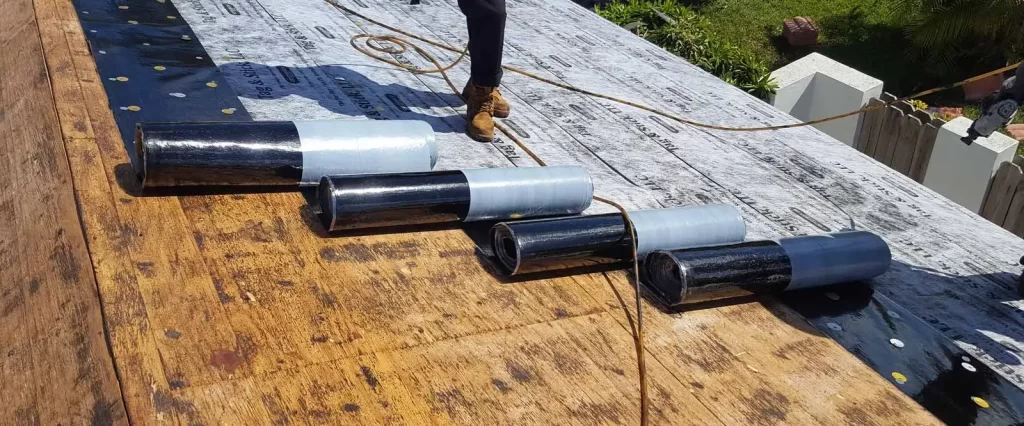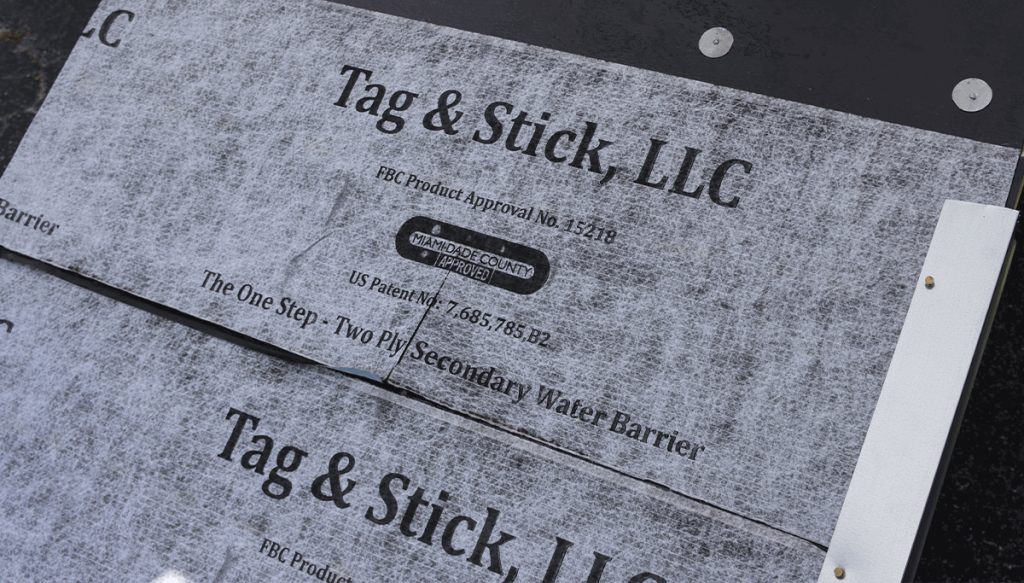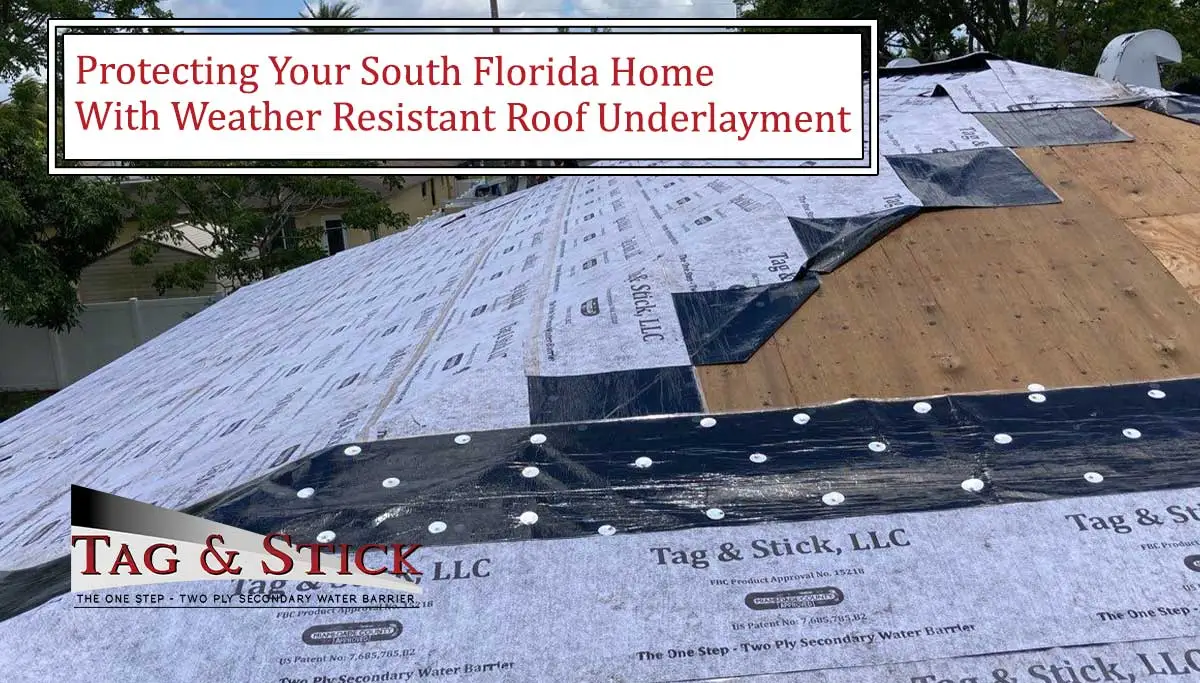Protecting Your South Florida Home With Weather Resistant Roof Underlayment
- What Is Roofing Underlayment?
- Why Is Weather Resistant Roof Underlayment Necessary In South Florida?
- What Are Three Roof Underlayment Regulations In Florida?
- What Are Three Different Types Of Weather Resistant Roof Underlayment?
- Talk To Tag & Stick Today About Your South Florida Roof Underlayment Needs
According to recent statistics, five million roofs are installed annually in the US. Surprisingly, an estimated 85 percent of the roofing industry in the US is dedicated to replacing roofs on existing homes rather than new installations.
However, whether you need a new roof installed on a new build or an existing roof replaced, you’ll need to choose the right weather-resistant roof underlayment. Roofing underlayment is a must-have as it keeps inclement weather from destroying your home while protecting your family.
Yet, since many different weather-resistant roof underlayment options are available on the market, it can be challenging to choose between them. That’s why the team at Tag & Stick has shared a few of the best weather-resistant roof underlayment options that can help you protect your South Florida home.
What Is Roofing Underlayment?

Roof underlayment is a barrier material installed directly onto a home’s roof to protect it from weather conditions. It is typically water-resistant, protecting the roof and home from unwanted moisture. The right roof underlayment will be weather-resistant enough to protect your home from mild to severe weather conditions like storms, snow, rain, sleet, ice, hail, and winds.
Why Is Weather Resistant Roof Underlayment Necessary In South Florida?
If there is one place where roofing underlayment is a necessity, it’s South Florida. This region often experiences severe weather, so weather-resistant roofing underlayment can be your home’s best protection against the weather.
Unlike in many other regions in the US, South Florida experiences heavy rainfalls, severe thunderstorms, and winds often – especially during hurricane season.
Fortunately, if you have an excellent weather-resistant roofing underlayment system installed, you won’t need to worry as much since it will act as an air-tight seal against water penetration, limiting the chances of you experiencing water leaks and damage.
In addition, Florida is known for its scorching temperatures, which can cause high energy costs and damage to roof shingles. With a weather-resistant underlayment, your roof will be better equipped to handle intense heat since underlayment can reflect heat and UV rays away from a house, keeping your home’s interior cool and reducing energy costs.
What Are Three Roof Underlayment Regulations In Florida?
Now that you know what roof underlayment is and why it’s a must-have in South Florida, you need to learn a little more about Florida’s roofing underlayment regulations. Knowing more about these requirements will help you choose the right type of weather-resistant roof underlayment.
Underlayment Weight
In Florida, all roofing underlayment for asphalt-saturated felt must weigh 15 pounds per 100 square feet. This requirement ensures that underlayment provides enough protection against wind-driven rain and other adverse weather conditions.
Underlayment Material
According to Florida’s Building Code regulations, all weather-resistant roofing underlayment must be made from approved materials like Tag & Stick, which Florida’s Building Commission has approved, or asphalt-saturated felt. If you fail to use approved materials, your home is at risk because it might not withstand Florida’s climate.
Self-Adhering Roof Underlayment
High to extreme wind speeds are the norm in South Florida, so self-adhering weather-resistant roofing underlayment is typically recommended or required. Self-adhering roofing underlayment is recommended because it is a consistently secure waterproof seal, preventing water infiltration during extreme weather and hurricanes.
What Are Three Different Types Of Weather Resistant Roof Underlayment?
There are far more than three types of roof underlayment options on the market, but only a select few offer true weather resistance for South Florida homes. Below, we’ve discussed three of the best weather-resistant roof underlayment options you should consider.
Synthetic Weather-Resistant Roof Underlayment
Synthetic underlayment, also known as non-bitumen synthetic underlayment, is a preferred choice by many builders because it is water-resistant. This type of underlayment is often fiberglass or another synthetic which ensures it provides stability and incredible tear resistance.
Its composition ensures it is resistant to mold and fungal growth, and its strength makes it able to contend with strong winds. It’s also usually used across the entirety of a deck, but sometimes waterproof products need to be added to provide more durability than is offered. In addition, this type of weather-resistant roof underlayment has a few disadvantages.
For example, synthetic weather-resistant roof underlayment requires specialized installation tools and is generally more expensive than asphalt-saturated weather-resistant roof underlayment.
Asphalt Saturated Felt Weather-Resistant Roof Underlayment
The preferred choice before synthetic products entered the market was asphalt-saturated felt weather-resistant roof underlayment. However, with the advancements in synthetic underlayment in the last two decades, it isn’t used as often, but this doesn’t make it a bad choice.
Asphalt-saturated felt weather-resistant roof underlayment is known as tar and felt paper because it is made from various natural plant fibers, polyester, cellulose, bitumen, and asphalt blends. However, a flexible base mat of these materials is soaked in asphalt to make this underlayment water-resistant and incredibly strong. An additional waterproof underlayment is typically added underneath to ensure a roof’s waterproofness.
One of the biggest benefits of asphalt-saturated felt weather-resistant roof underlayment is its multiple thickness options, so adhering to Florida’s thickness and weight requirements isn’t a worry. It’s also worth noting that this type of underlayment is less expensive than comparable products, but its weight can make it harder to install, and it’s far more susceptible to cracking and wrinkling.
Self-Adhered Weather-Resistant Roof Underlayment
In the last few years, self-adhered weather-resistant roof underlayment has become popular among those looking to build or replace an existing roof. This type of underlayment has a sticky back that adheres to a roof deck, creating a waterproof seal between your roof deck and the underlayment.
Unlike the other roofing underlayment options on the market, self-adhered weather-resistant roofing underlayment is versatile, strong, incredibly waterproof, and inexpensive compared to other underlayment options.
However, even among self-adhered weather-resistant roof underlayment, some stand out from others in this range – like Tag & Stick. This unique 2-ply reinforced fiberglass weather-resistant roof underlayment has been soaked in modified asphalt, ensuring unparalleled versatility and protection against bad weather in South Florida.
This underlayment has a 55-millimeter bottom layer and a 60-millimeter top layer, equaling a combined thickness of 115 millimeters. It is engineered to provide a reliable and smooth foundation for roofing materials like asphalt shingles, tile roofs, and metal panels. It is also innovatively designed to adhere to sloping roofs and won’t damage the sheathing.
Talk To Tag & Stick Today About Your South Florida Roof Underlayment Needs

Now you know why your South Florida home needs protection and why weather-resistant roof underlayment is the right choice. Our team at Tag & Stick hopes that we have provided you with enough information on underlayment.
If you are interested in our Tag & Stick self-adhered weather-resistant roof underlayment, you can speak with us here. We’re excited to tell you more about our innovative underlayment, how it can protect your South Florida home, and why it’s the best weapon against inclement weather.
